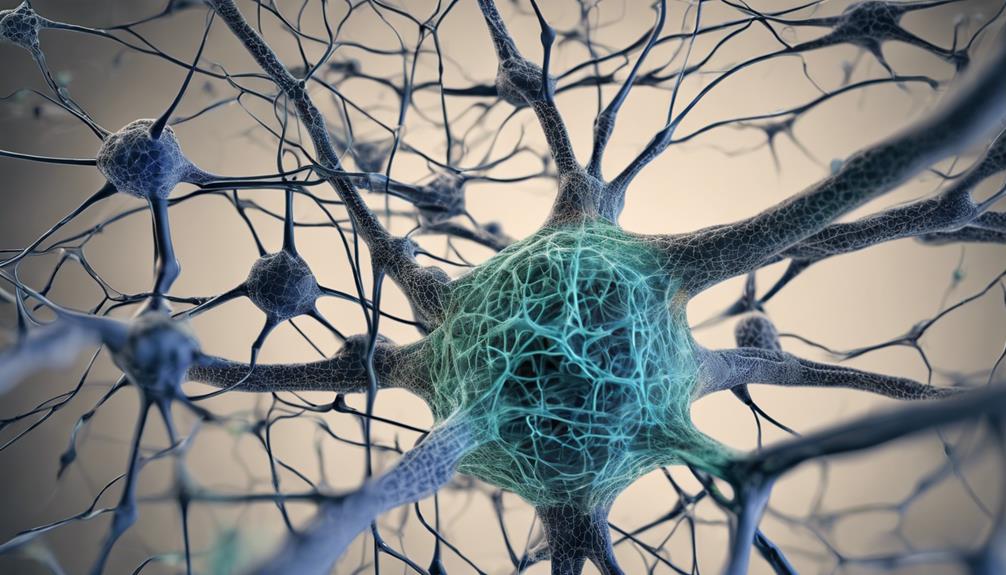Delving into the complex world of mental health, it is intriguing to witness the transformation of the term Dementia Praecox into the modern concept of schizophrenia.
The journey of understanding this condition, from its roots in Kraepelin's work to modern-day diagnostic and treatment approaches, unveils a tapestry of complexities that continue to intrigue researchers and clinicians alike.
Join us in unraveling the layers of symptoms, causes, and interventions that shape our comprehension of Dementia Praecox and its impact on individuals and their loved ones.
Key Takeaways
- Genetic and environmental factors contribute to risk.
- Accurate diagnosis crucial for tailored treatment.
- Antipsychotic medications and psychotherapy are primary treatments.
- Coping strategies, rehabilitation, and support essential for managing symptoms.
Symptoms of Dementia Praecox
In individuals with dementia praecox, a range of symptoms can manifest. Negative symptoms such as loss of interest, flat facial expression, and lack of motivation are common. These individuals may also experience cognitive difficulties like problems with information processing, difficulties in concentrating, and memory issues.
On the other hand, positive symptoms, including hallucinations, delusions, and heightened suspicions, are often observed in schizophrenia. Behavioral changes such as social withdrawal, reduced communication, and impaired decision-making can be prevalent in those with dementia praecox. Additionally, emotional disturbances like emotional blunting, lack of emotional expression, and inappropriate emotional responses are seen in affected individuals.
Understanding these symptoms is crucial for early detection and appropriate intervention to provide the necessary support and care for individuals grappling with dementia praecox. By recognizing and addressing these symptoms promptly, we can better serve those in need and improve their quality of life.
Causes and Risk Factors

Genetic factors significantly influence the development of dementia praecox, with a higher likelihood in families with a history of schizophrenia and multiple genes contributing to increased risk. Environmental and social factors such as poverty, childhood trauma, and urban residence can also play a role in the onset of dementia praecox. Complications during pregnancy, including bleeding, oxygen deprivation, and disturbances in brain development, are potential risk factors for developing the condition.
Brain structure abnormalities, neurotransmitter dysfunction, and changes during puberty are implicated in the pathophysiology of dementia praecox.
The combination of genetic predisposition, environmental triggers, and neurobiological factors contributes to the complex etiology of dementia praecox.
Research by Kraepelin and Bleuler has provided insights into the interplay of genetic and environmental factors in the development of this disorder.
Understanding the multifaceted nature of these causes and risk factors is crucial for early identification and intervention to better serve individuals affected by dementia praecox.
Diagnosis and Differential Diagnosis
Upon conducting a comprehensive evaluation, mental health professionals utilize criteria from the DSM to assist in diagnosing dementia praecox, ensuring an accurate identification of this complex disorder.
The diagnostic concept of dementia praecox was first introduced by the Swiss psychiatrist Eugen Bleuler, who revised Emil Kraepelin's classification of Mental Illness.
Symptoms of schizophrenia, such as hallucinations, delusions, disorganized thinking, and negative symptoms, are central to the diagnosis of dementia praecox.
Differential diagnosis plays a crucial role in distinguishing dementia praecox from other psychiatric conditions that share similar symptomatology. Evaluating cognitive functioning, symptom duration, and response to treatment are key aspects of the differential diagnostic process.
Accurate diagnosis in the early stages is essential for implementing appropriate treatment strategies and interventions tailored to the specific needs of individuals with dementia praecox. Mental health professionals rely on the DSM criteria to guide them through the diagnostic journey and ensure the best possible care for their patients.
Treatment Options Available

Following the diagnostic assessment of dementia praecox, mental health professionals typically recommend a combination of antipsychotic medications and psychotherapy as primary treatment options to address the symptoms associated with this complex disorder. Early intervention is crucial in managing schizophrenia effectively.
Medications, especially antipsychotics, are commonly prescribed to help alleviate symptoms such as hallucinations, delusions, and cognitive impairments. Psychotherapy, including cognitive behavioral therapy, is instrumental in assisting individuals with dementia praecox in coping with the challenges they face.
Additionally, symptom management strategies are tailored to address the specific manifestations of the illness, promoting improved overall functioning and quality of life for those diagnosed with schizophrenia. Societal reintegration programs are designed to support individuals in their journey towards recovery and facilitate their successful reintegration back into the community, emphasizing the importance of holistic care and ongoing support provided by a multidisciplinary team.
Coping Strategies and Support
Engaging in cognitive behavioral therapy can assist individuals with dementia praecox in developing effective coping strategies to manage their symptoms and challenges. This type of therapy, pioneered by psychiatrist Emil Kraepelin, focuses on identifying and changing negative thought patterns and behaviors.
Additionally, participation in rehabilitation programs can support individuals with dementia praecox in improving daily functioning and quality of life. These programs often involve a combination of therapy sessions, educational programs, and self-care practices aimed at enhancing overall well-being.
Self-care practices play a crucial role in managing symptoms of dementia praecox. Maintaining a healthy lifestyle, managing stress effectively, and adhering to a structured routine can significantly impact symptom progression. Educational programs designed for families can provide valuable information and support, helping them understand the condition and offer appropriate care.
Moreover, support groups and therapy sessions offer a supportive environment for individuals with dementia praecox and their families to share experiences, gain insights, and receive emotional support during their coping journey.
Frequently Asked Questions
What Is Dementia Praecox Called Now?
We now call dementia praecox schizophrenia, a term coined by Eugen Bleuler in the early 20th century. This change reflects a deeper understanding of the disorder's nature and prognosis.
Schizophrenia encompasses severe mental disorders characterized by disturbances in thought, perception, and behavior, including hallucinations, delusions, disorganized thinking, and negative symptoms like social withdrawal.
The shift from dementia praecox to schizophrenia marked a pivotal evolution in psychiatric diagnosis and conceptualization.
What Is the Other Name for Dementia Praecox?
Another name for dementia praecox is schizophrenia. It's a term coined by Eugen Bleuler in the early 20th century, signifying a significant shift in understanding and diagnosing the disorder.
The categorization by Kraepelin included subtypes like paranoid, catatonic, and hebephrenic schizophrenia, emphasizing the split between reality and the mind.
This evolution from dementia praecox to schizophrenia marked a crucial advancement in psychiatric classification and diagnosis.
What Are the Symptoms of Dementia Praecox?
When examining the symptoms of dementia praecox, one can observe a wide range of manifestations. These can include:
- Negative symptoms like loss of interest and lack of motivation,
- Cognitive impairments such as difficulties with concentration, and
- Positive symptoms like hallucinations and delusions.
Emotional withdrawal, social isolation, and disorganized thinking are also prevalent.
Furthermore, disruptions in speech, such as incoherence or tangentiality, are often observed in individuals affected by this condition.
What Does Praecox Mean?
We've delved into the meaning of 'praecox.' In Latin, it signifies 'early,' highlighting the swift onset or progression of a condition. This term often denotes the prompt emergence of symptoms or the rapid advancement of a disorder.
'Praecox' portrays a sense of urgency, alerting us to the quick pace at which certain conditions manifest and evolve. It serves as a signal of the need for timely attention and action.
Conclusion
In conclusion, individuals with Dementia Praecox face a challenging journey filled with unique symptoms and treatment options.
While the road ahead may be difficult, with proper diagnosis and early intervention, there's hope for managing this complex mental illness.
Through a combination of medication, psychotherapy, and support, individuals and their families can navigate the complexities of this condition with resilience and determination.









